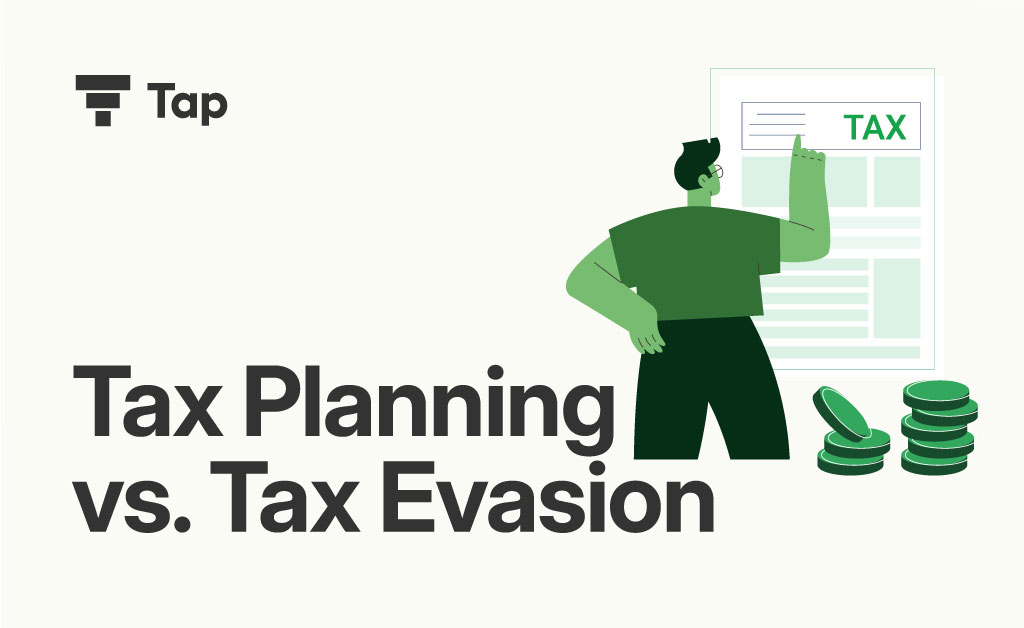Understanding the Difference Between Tax Planning and Tax Evasion

For both individuals and businesses, navigating the intricacies of tax obligations can be a daunting task. However, a critical distinction exists between two key strategies: tax planning and tax evasion. Misinterpreting these concepts can lead to significant legal ramifications and financial penalties. This blog aims to demystify these terms by exploring their core differences.
Tax Planning: A Strategic Approach:
Tax planning involves legally using financial strategies to reduce taxes. This includes using deductions, credits, tax-advantaged investments, and keeping detailed records. The goal is to use available tax benefits within the law to optimize tax efficiency.
In essence, tax planning means “managing your finances to use all legal exemptions, deductions, and benefits to lower your taxes.” It represents a proactive approach where taxpayers take advantage of existing tax rules.
Tax Evasion: A Deceptive Practice:
Tax evasion is intentionally breaking the law to avoid paying taxes. This includes lying about income, making up deductions, hiding money, or not filing taxes. It’s a crime with severe penalties like big fines and jail time. Unlike legal tax planning, tax evasion is illegal and harms the tax system.
Key Differences Between Tax Planning and Tax Evasion:
A clear picture exists between tax planning and tax evasion across several key aspects:
- Legality: Tax planning is entirely legal and encouraged by tax authorities. It involves adhering to tax code provisions to reduce tax burdens. Conversely, tax evasion is illegal and punishable by law, as it employs deceptive practices to escape taxes.
- Methods Employed: Tax planning utilizes legitimate tools such as investing in tax-saving instruments, claiming eligible deductions, and making charitable contributions. Tax evasion, however, relies on illegal methods like underreporting income, falsifying records, and concealing assets.
- Consequences: Tax planning leads to optimal tax efficiency and ensures legal compliance. On the other hand, tax evasion results in legal repercussions, including fines, penalties, and potential imprisonment.
- Objective: Tax planning strives to achieve tax efficiency by maximizing deductions and credits. Conversely, tax evasion aims to avoid tax payments entirely through unlawful means.
Importance of Ethical Tax Practices:
Engaging in ethical tax practices goes beyond legal compliance; it supports the nation’s economy. Taxes fund crucial services like healthcare, education, and infrastructure. While tax planning wisely minimizes taxes, tax evasion harms these public benefits and is unethical.
Conclusion:
Understanding the difference between tax planning and tax evasion is key to responsible financial management. Proper tax planning legally reduces your tax burden, while tax evasion can lead to serious legal trouble. Staying informed and compliant with tax laws ensures financial health and integrity.
Using legitimate tax planning strategies helps you optimize your taxes within legal limits. Remember, the goal is to be tax-savvy, not to evade your taxes illegally.
At Tap Invest, we offer fixed income investment options like invoice discounting, asset leasing, P2P lending, and bonds. Sign up today to start optimizing your investments with Tap Invest!
Key FAQs On Tax Planning Vs. Tax Evasion:
- What is the difference between tax planning tax evasion and tax evasion?
Tax planning is the legal and strategic approach to managing finances to minimize tax liability using available deductions, exemptions, and credits. Tax evasion is the illegal practice of deliberately misrepresenting or hiding information to avoid paying taxes, which can lead to legal consequences including fines and imprisonment.
- What is the meaning of tax planning and tax avoidance?
Tax planning is the legal strategy of managing finances to minimize tax liability by using available deductions, exemptions, and credits. Tax avoidance involves using legal methods to reduce tax payments but often exploits loopholes in the tax code, walking a fine line between legal and unethical practices.
- What is the difference between tax planning and financial planning?
Tax planning focuses on strategies to minimize tax liability through legal means, such as deductions and credits. Financial planning is a broader approach that includes managing all aspects of finances, like budgeting, saving, investing, and retirement planning, with tax planning being one component.
- What do you mean by tax planning?
Tax planning refers to the strategic management of financial affairs to minimize tax liability within the framework of the law. It involves utilizing deductions, exemptions, credits, and other tax-saving strategies to reduce the amount of taxes owed, ensuring that individuals and businesses pay their fair share while optimizing their financial situation.
- What is an example of tax evasion?
One example of tax evasion is underreporting income. This could involve failing to report income from side hustles, rental properties, or cash payments received for work.
